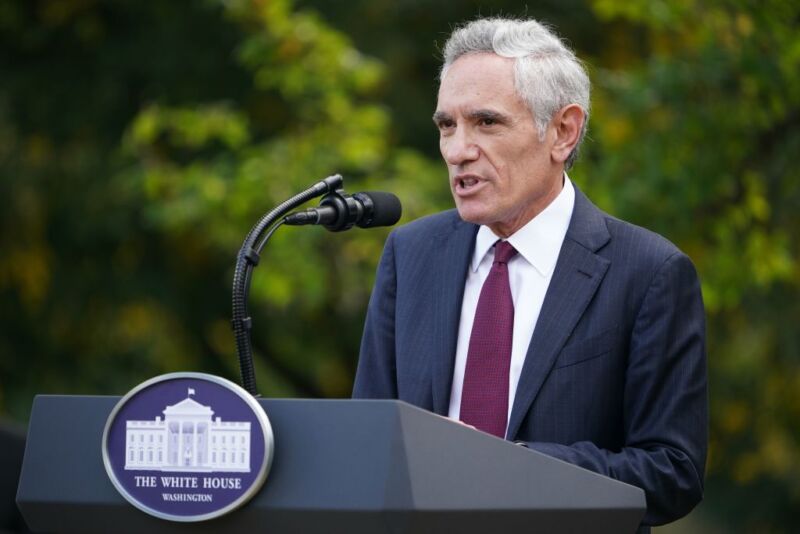
While one congressional committee seems to be grabbing all the headlines recently, other investigations of the Trump administration have continued in the background. One of them is trying to determine how the US’s response to the coronavirus pandemic went so wrong that the country ended up with over a million deaths and one of the worst per-capita death rates in the world. In its own words, the committee’s goal is “to ensure the American people receive a full accounting of what went wrong and to determine what corrective steps are necessary to ensure our nation is better prepared for any future public health crisis.”
In its latest report, released on Tuesday, the committee details the White House career of Scott Atlas, a neuroradiologist with no infectious disease experience. Atlas’ hiring by the White House was expected to be so controversial that he was initially instructed to hide his staff ID from the actual government public health experts. Yet he quickly became a driving force for the adoption of policies that would achieve herd immunity by allowing most of the US population to be infected—even as other officials denied that this was the policy.
How’d this guy get here?
Atlas’ lack of relevant expertise raises questions as to why he was hired in the first place. The new report details that he wasn’t shy about voicing his opinions about the pandemic response, making multiple TV appearances to complain about the policies advocated by actual public health experts. He also directly reached out to a senior government official, calling the US’s response “a massive overreaction” to a virus he estimated “would cause about 10,000 deaths.”
This eventually got him meetings with a number of White House officials, including Trump and his son-in-law, Jared Kushner. After that meeting, Kushner hired Atlas as pandemic adviser but knew that the hiring would not go over well with the government’s public health experts. As a result, Atlas was told to continue working remotely from California, not to introduce himself on conference calls, and to hide his White House ID card when he met with Coronavirus Response Coordinator Deborah Birx. Atlas exited stealth mode when he switched to working in the White House.
Once there, Atlas began participating in the activities of the White House Coronavirus Task Force, meant to formally coordinate the government’s pandemic activities. But Atlas also sat in on less formal meetings with mostly political figures within the Trump administration, such as Kellyanne Conway and Hope Hicks. These meetings were referred to as “China Virus Huddles,” and provided Atlas with a route to influence policy that avoided disagreements with public health specialists. Birx suspected that this allowed Atlas to craft what she called “parallel data streams” for the president that didn’t reflect official government pandemic figures.
According to testimony and documents received by the committee, Atlas used this to promote the idea of reaching herd immunity prior to the availability of vaccines—a route that would see most of the US population infected at a time when there was little in the way of effective treatments. This approach received some backing from political figures in the Trump administration but was vigorously opposed by public health experts. The net result was a set of contradictory public statements and some rapid reversals of official government policy.
Don’t follow the herd
The idea behind herd immunity as promoted by Atlas is to allow most individuals to go about their normal lives, while steps are taken to avoid infections of vulnerable populations such as the elderly and immunocompromised. Almost all public health experts dismissed this idea, recognizing both the risks COVID-19 posed to the otherwise healthy, and the near impossibility of keeping the at-risk populations from being exposed.
To get his ideas adopted over these objections, Atlas took a two-track approach: bring in other herd immunity advocates to influence political figures and sideline public health experts on policy decisions.
Advocates for herd immunity made their arguments in favor of it public through a document called the Great Barrington Declaration, named after the town that hosts the libertarian think tank where it was drafted. Atlas invited many of the documents’ signatories to brief White House figures, including Joseph Ladapo, who went on to play a key role in limiting public health efforts in Florida.
Birx, supposedly in charge of the coronavirus response, dismissed these figures as “a fringe group without grounding in epidemics, public health, or on-the-ground common sense experience.” But the committee found that Atlas began sending ‘opposite opinions’ that contradicted Birx’s daily coronavirus reports to members of the White House staff. He also issued a public statement indicating that the herd immunity approach was formal policy, saying, “targeted protection of the vulnerable and opening schools and society policy matches the policy of the President and what I have advised.” And two White House officials gave an anonymous background briefing to the press that indicated the Trump administration had adopted herd immunity as a policy.
Faced with this, at one point, Birx sent an email to then-Centers for Disease Control and Prevention director Robert Redfield and Anthony Fauci that simply said “I just can’t.”
Despite team herd’s apparent success, when questioned directly, Atlas denied he ever suggested the idea. Alex Azar, who served as secretary of Health and Human Services, also appeared to promote herd immunity publicly but denied it when questioned. (The committee suggests this contradiction “raises serious questions about the veracity of Secretary Azar’s representations to Congress.”)
https://arstechnica.com/?p=1862565

